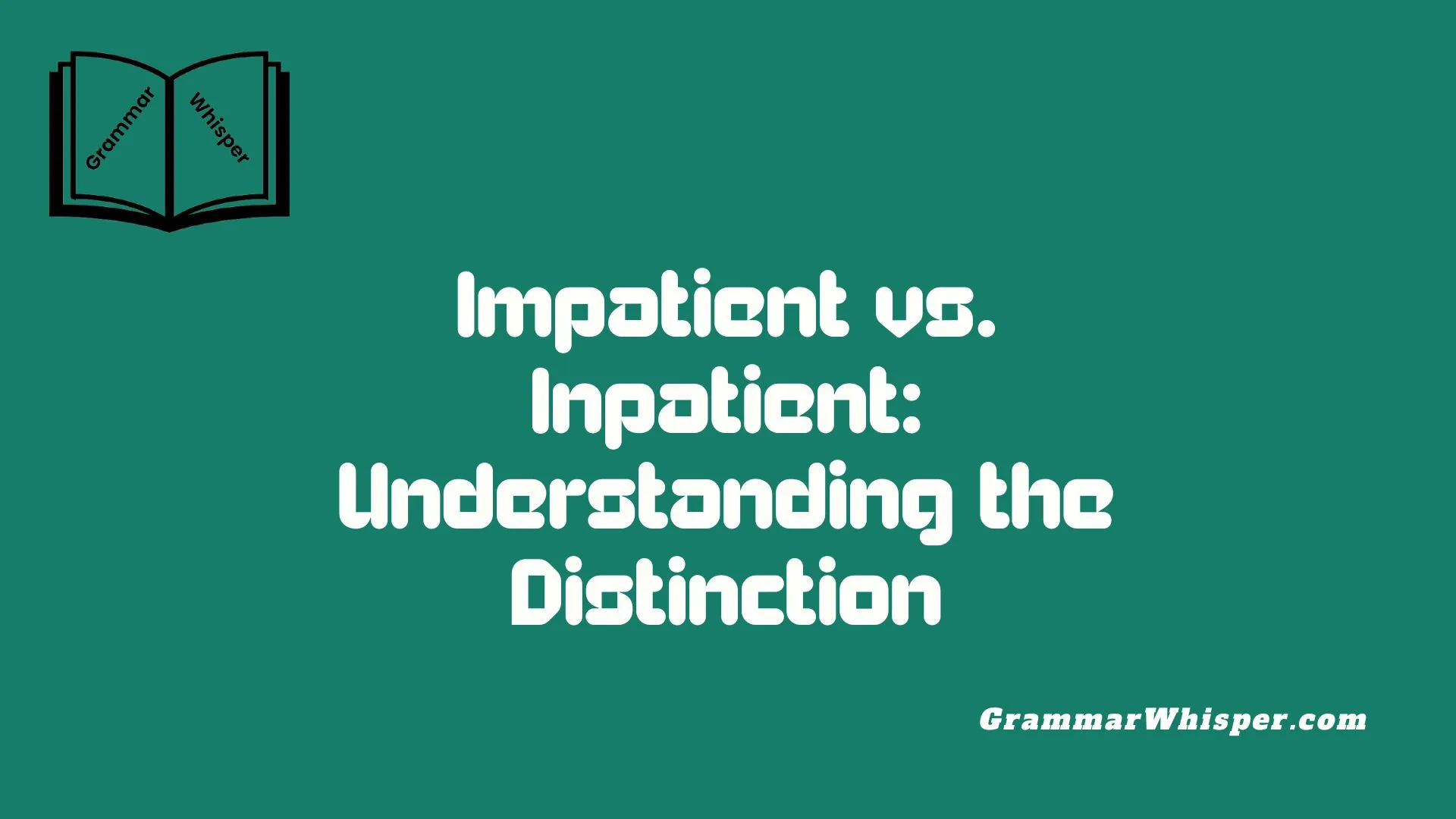Language has many small variations that cause confusion, especially with similar-sounding words like impatient vs inpatient. These terms look alike in spelling, but their meanings and usages are quite different. It is essential to understand the distinction to prevent errors in communication. Using the right word in the correct context can change your message completely. This article will break down and explore these differences in depth, offering tips to help you remember them clearly.
From my personal experience, mixing up these words can confuse readers and listeners. Understanding the language nuances improves your writing and speaking, making them more precise and professional. The word impatient usually shows a feeling of restlessness or eagerness, while inpatient refers to a medical context, meaning someone admitted to a hospital. Knowing these variations boosts your confidence and helps make your communication clearer and more effective.
Exploring the Definition of “Impatient”
The word “impatient” refers to a state of emotional frustration or eagerness. It typically describes a person’s emotional reaction to waiting, delays, or situations that don’t meet their expectations.
Definition: When someone is impatient, they feel a sense of unease or restlessness due to the perceived slowness or inefficiency of a situation. They often find it difficult to endure delays or wait for things to happen on their timeline.
Emotional Implications: Being impatient is often accompanied by feelings of frustration, anxiety, and irritability. If you’ve ever been stuck in traffic, waiting for a delayed flight, or waiting in a long line, you’ve likely experienced impatience. It’s a human reaction to situations that feel outside of our control or when things don’t move fast enough for our liking.
Common Triggers for Impatience:
- Waiting for something important (e.g., a long-awaited phone call or email).
- Delays or setbacks in personal or professional tasks.
- Situations that feel unproductive or that drag on without resolution (e.g., waiting for slow service at a restaurant).
The Emotional Implications of Being Impatient
Impatience, though common, can have emotional consequences if it’s not managed properly. It’s not just a passing feeling; it can affect your mood, behavior, and interactions with others.
Psychological Aspects: Impatience is closely linked to emotional regulation. When we feel impatient, our brain perceives the delay or obstacle as an annoyance or barrier, triggering a reaction that may be disproportionate to the situation. This emotional response can lead to stress, irritability, and even anger if left unchecked.
Impacts on Behavior: Impatient individuals often display behavior that reflects their internal frustration. For instance, they might speak more abruptly, show impatience through body language (e.g., tapping feet, sighing loudly), or make hasty decisions without fully considering the consequences.
Potential Long-term Effects on Mental Health: Chronic impatience can contribute to higher levels of stress, which may, over time, lead to burnout or anxiety. Furthermore, persistent impatience might affect relationships, as people who are frequently impatient may come across as unempathetic or inconsiderate of others’ needs or situations.
Common Expressions Featuring “Impatient”
Understanding how “impatient” fits into everyday language is important for grasping its true meaning. Here are some common expressions featuring “impatient”:
- “Impatient waiting”: This refers to the experience of waiting in a situation where the individual is unable to control the timing or speed. For example, “She grew impatient waiting for her results.”
- “Impatient with someone”: This is used when someone feels frustrated with another person, often due to their actions or behavior. Example: “I’m getting impatient with how long you’re taking to respond to my questions.”
- “Impatient at something”: This phrase emphasizes the frustration or irritation felt at a situation. For instance, “He was impatient at the slow progress of the project.”
The Linguistic Roots of “Impatient”
Etymology: The word “impatient” comes from the Latin root impatientem, where in- means “not” and patiens means “suffering” or “enduring.” This is a direct reference to the inability to endure or suffer something without frustration or irritation. The word has evolved to its modern meaning, which primarily refers to emotional responses to delays or inefficiency.
Related Words:
- Impatience: The noun form of “impatient,” representing the state or feeling of being impatient.
- Patient: Often misunderstood as the opposite of impatient, it refers to the ability to endure without frustration.
The Meaning and Usage of “Inpatient”
While “impatient” deals with emotional frustration, “inpatient” refers to a completely different concept. “Inpatient” is a term used in the medical field to describe a person who stays in a hospital or healthcare facility for treatment that requires at least one overnight stay.
Definition: An inpatient is someone who is admitted to a hospital for treatment that requires constant monitoring, care, or observation. This treatment typically cannot be completed in a single visit to a healthcare provider.
Clarity in Context: “Impatient” and “Inpatient” in Sentences
“Impatient” in Context:
- Example 1: “John grew impatient as the hours ticked by during the job interview process.”
- Example 2: “The teacher could sense the students becoming impatient as they waited for the exam results.”
“Inpatient” in Context:
- Example 1: “The hospital admitted the patient as an inpatient after the surgery for further observation.”
- Example 2: “Due to the severity of his condition, he was classified as an inpatient for an extended period.”
Identifying “Impatient” in Everyday Language
Impatience is something we all encounter in our daily lives. Whether you’re waiting for an email response or sitting in traffic, impatience can easily creep in.
Common Scenarios:
- Work: Waiting for important emails or feedback on a project.
- Social: Feeling impatient when waiting for others to arrive at a meeting or event.
- Personal: Growing frustrated when a task takes longer than expected, such as waiting for your food to cook or a device to update.
Signs of Impatience:
- Tapping your foot or checking the time repeatedly.
- Interrupting others in conversation or making short, sharp responses.
- Becoming agitated or visibly uncomfortable in situations that involve waiting.
Managing Impatience: While impatience is natural, it’s important to manage it. Here are some strategies to keep your impatience in check:
- Mindfulness: Practice mindfulness techniques to calm your mind and focus on the present moment.
- Deep breathing: Take deep breaths to help reduce frustration.
- Change your perspective: See the waiting period as an opportunity to relax or accomplish other small tasks.
Understanding “Inpatient” Through Examples
Unlike “impatient,” “inpatient” is almost exclusively used in a medical context. Here’s how “inpatient” is used in sentences:
Hospital Scenarios:
- “After the accident, the doctor decided that Mark needed inpatient care for a few days to monitor his condition.”
- “The hospital has a dedicated inpatient unit for those undergoing major surgeries.”
Inpatient vs. Outpatient: The difference between inpatient and outpatient care is important to note:
- Inpatient care involves staying overnight or longer in a healthcare facility.
- Outpatient care refers to treatments or surgeries that do not require an overnight stay.
Remembering the Difference: Tips and Tricks
Here are some quick and simple tips to remember the difference between impatient and inpatient:
- “Impatient” = Emotion: If you’re feeling frustrated or restless, it’s likely impatience.
- “Inpatient” = Medical Care: Think about being in a hospital bed—this will help you remember that “inpatient” is related to hospital stays.
Mnemonic Device: To remember “impatient,” think of someone in a hurry or frustrated by a delay. For “inpatient,” think about staying in a hospital bed for overnight care.
Common Misconceptions and Errors to Avoid
A common mistake is mixing up impatient and inpatient in everyday conversations, especially when referring to medical or health-related scenarios. People may incorrectly use “impatient” when talking about hospital stays, but remember: if it’s about healthcare, it’s almost certainly “inpatient.”
Conclusion
Understanding the difference between impatient and inpatient can prevent misunderstandings and improve your communication, especially in medical and emotional contexts. While impatient reflects a state of emotional frustration, inpatient refers specifically to a hospital stay. By using these terms correctly, you can communicate more clearly and accurately, whether in casual conversation or professional settings.
Faqs
What’s the difference between “impatient” and “inpatient”?
The key difference lies in their usage. “Impatient” refers to a feeling of frustration or restlessness, typically experienced when waiting for something. On the other hand, “inpatient” refers to a patient who stays in a hospital for at least one night for treatment.
Can “impatient” be used in medical contexts?
While “impatient” primarily refers to emotional frustration, it can be used in medical contexts when describing a person’s behavior, such as in a scenario where a patient is growing impatient due to long wait times. However, it is not a term used to describe someone in need of hospital care.
Is “inpatient” ever used outside of medical contexts?
No, “inpatient” is a term almost exclusively used in healthcare to describe patients admitted to a hospital for overnight or extended care. It is not typically used outside of the medical or healthcare setting.
How can I avoid confusing “impatient” and “inpatient”?
A helpful way to remember is that “impatient” is related to emotional frustration and impatience, whereas “inpatient” always refers to someone staying in a hospital for treatment. A mnemonic device could be: “Impatient” = frustration, “Inpatient” = hospital stay.
Is “inpatient” a more formal term than “impatient”?
Yes, “inpatient” is a more technical, formal term primarily used in healthcare, while “impatient” is a general, everyday term that describes a person’s emotional state.











